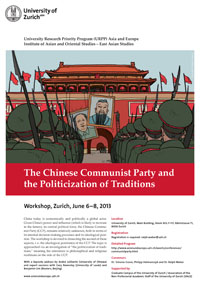The Chinese Communist Party and the Politicization of Traditions
Workshop, June 6–8, 2013
Convenors
Dr. Simona Grano, Philipp Hetmanczyk and Dr. Ralph Weber
Organization
URPP Asia and Europe and the Institute of Asian and Oriental Studies – East Asian Studies
Location
University of Zurich, Main Building, Room KOL F-117, Rämistrasse 71, 8006 Zurich
Registration
Registration is required: ralph.weber{at}uzh.ch
Description
China today is economically and politically a global actor. Given China’s power and influence (which is likely to increase in the future), its central political force, the Chinese Communist Party (CCP), remains relatively unknown, both in terms of its internal decision-making processes and its ideological position. The workshop is devoted to dissecting the second of these aspects, i. e. the ideological position(s) of the CCP. The topic is approached via an investigation of “the politicization of traditions,” meaning the references to philosophical and religious traditions on the side of the CCP.
At the workshop, two fields of inquiry will receive special attention:
- The way that the party deals with traditional resources may serve as an indicator for party-internal differences. The analysis of such processes of politicization carries the potential of adding a further dimension to existing models on different factions within the CCP (Maoists vs. Liberals, Youth League vs. Shanghai Clique). Who are the actors in the party driving the politicization of traditional resources or opposing such efforts, and how, if at all, can such processes be related to the division of factions as either "reformist-liberal" or "radical socialist"?
- Whether or not the CPP refers to traditions in its official and political rhetoric is instrumental for understanding the processes of the construction of the party ideology. The doctrine of the "harmonious society", put forth in 2006, exemplifies and illustrates this point by combining socialist and Confucian terminology. At the same time, several questions arise: What kind of terminological regulations and historical narratives are used to relieve the mentioned tension? How are potentially existing factional divides hidden? What precise function do such traditional references serve in the ideological framing of political processes?
These two fields of inquiry do by no means reflect marginal phenomena of political positioning, but represent neuralgic points of the CCP's ideological agenda. There are many political contexts that may be investigated in view of the problematique of the politicization of traditions such as party and cadre discipline, social order, civil society and the publich sphere, culturalist legitimization of the party and the nation, traditions as resources for use of soft power, or ideological framing of China's 'peaceful rise'.
Program
| Thursday, 6 June 2013 | ||
| 14.00–14.15 | Welcome Address by Simona Grano, Philipp Hetmanczyk and Ralph Weber | |
| 14.15–15.15 |
Natalia Lisenkova
(University of Zurich) Domestic Factors of Chinese Foreign Policy: Nationalism as a National Security Issue | |
| 15.15–16.15 |
Giorgio Strafella
(University of Nottingham and University of St. Gallen) ’Marxism’ as Tradition in CCP Discourse | |
| 16.15–16.45 | Coffee Break | |
| 16.45–18.15 |
Expert-Session with
Gary Rawnsley (University of Leeds) Chinese Soft Power and Public Diplomacy: A Mid-Term Assessment | |
| Friday, 7 June 2013 | ||
| 09.30–10.30 |
Nele Noesselt (German
Institute of Global and Area Studies, Hamburg) Relegitimizing the Chinese Party-State: ‘Old’ Sources of Modern Chinese Power | |
| 10.30–11.00 | Coffee Break | |
| 11.00–12.00 |
Ai Jiawen
(University of Melbourne) Official Marxists vs. Neo-traditionalists: The Story of a Cultural Symbolic City and the Vanishing Statue of Confucius | |
| 12.00–14.00 | Lunch Break | |
| 14.00–15.00 |
Julie Remoiville (Ecole
Pratique des Hautes Etudes, Paris) Involvement of Local Authorities in Popular Religion in Urban Context: A Micro-Sociological Study in Contemporary Hangzhou | |
| 15.00–16.00 |
Philipp Hetmancyzk
(University of Zurich) From ‘Feudal Superstition’ to ‘Intangible Cultural Heritage’: Party Ideology and the Changing Role of Religion | |
| 16.00–16.30 | Coffee Break | |
| 16.30–18.00 |
Keynote Address,
André Laliberté (University of Ottawa) The Selective Retrieval of Religion in the Communist Party’s Quest for Legitimacy | |
| 19.00 | Conference Dinner, Zunfthaus Zum Grünen Glas (on invitation only) | |
| Saturday, 8 June 2013 | ||
| 09.30–10.30 |
Anna Ahlers
(University of Bonn) Local Party and Cadre Discipline | |
| 10.30–11.00 | Coffee Break | |
| 11.00–12.30 |
Expert-Session with
Benjamin Lim (Reuters, Beijing) Taking the Dragon’s Pulse | |
